The digital age has changed the way we learn. Today, online education is leading this change and becoming an important part of learning for students everywhere. At DBU Online, we see a world where learning is flexible, accessible, and supported by technology.
Online education is no longer just a backup option — it is now a main path for many learners. Students can study from home, at work, or even while caring for family. The future of online education will bring better learning experiences, more personalised programmes, and stronger connections with the global job market.
DBU Online offers a wide range of undergraduate and postgraduate programmes through an advanced online learning system. Our degrees are UGC-entitled, globally recognised, and delivered with modern infrastructure.
1. Flexibility – The Core of Online Learning
One of the main features of the future of online education is flexibility. Students no longer need to travel to college or follow a fixed timetable.
At DBU Online, students can:
- Log in to the Learning Management System (LMS) from anywhere, anytime.
- Learn at their own speed and convenience.
- Take on-demand examinations, choosing when they feel ready.
This flexibility helps working professionals, parents, and people in remote areas continue their education without stress.
2. Career-Based Learning
Another big trend in the future of online education is career-based learning. Students want practical skills that are useful in real jobs.
At DBU Online:
- The curriculum is industry-focused and connects theory with practice.
- Students get hands-on experience through projects and internships.
- Collaboration with industry experts helps students build a professional portfolio.
This approach ensures graduates are job-ready, not just degree-holders.
3. Global Connectivity
The future of online education is becoming more global. With teachers and learners connected from around the world, online education removes geographical limits.
DBU Online focuses on:
- Globally recognised faculty and teaching methods.
- Collaboration with experts and peers across borders.
- Exposure to different cultures and ideas through online platforms.
In the coming years, tools like Virtual Reality (VR) and Augmented Reality (AR) will make online learning more interactive and engaging.
4. Personalised Learning
Every student learns differently, and the future of online education supports that.
With the help of Artificial Intelligence (AI) and data analytics, online education will become more personalised.
At DBU Online:
- Students receive 24×7 learner support.
- The LMS offers a customised learning path.
- Interactive modules help students learn at their own pace.
Future systems will be able to detect when a learner is facing difficulty and provide extra help automatically.
5. Accessibility and Inclusivity
The future of online education will make quality learning available to everyone, no matter where they live.
DBU Online aims to:
- Help rural students, working professionals, and homemakers study from home.
- Offer resources accessible from any device.
- Provide learning support for students with disabilities.
This ensures education for all, with no one left behind.
6. Strong Support and Community
Online education is not just about studying alone.
It also builds a community of learners, mentors, and peers.
DBU Online provides:
- Networking opportunities with alumni and industry experts.
- Interactive discussions, group projects, and events.
- Career services and mentoring support.
This social connection keeps students motivated and engaged throughout their course.
7. Degree Recognition and Equivalence
For online education to grow, online degrees must be valued equally.
DBU Online ensures:
- All online degrees are equal to on-campus programmes.
- Courses are approved and recognised by regulatory bodies.
- Employers and institutions accept DBU Online degrees with full credibility.
This equality in recognition will continue to strengthen the future of online education.
8. Advancing Technology Infrastructure
Technology is the backbone of online education.
The future of online education will include:
- Faster internet and mobile-friendly systems.
- Interactive video sessions and fun learning activities.
- Smart devices integrated into classrooms.
DBU Online already uses a strong LMS and advanced digital infrastructure to make learning easy and effective.
9. Engagement and Quality Learning
A common challenge in online learning is keeping students motivated.
DBU Online addresses this through:
- Interactive sessions with industry professionals.
- Real-time discussions and live classes.
- Personalised learner support and feedback.
Future online systems will continue to make learning more interactive and socially connected.
10. Short lessons and Modular Courses
Another important change in the future of online education is short lessons.
This means students can:
- Study small modules at a time.
- Combine these modules to earn certificates or full degrees.
- Learn continuously while working.
This model supports lifelong learning and Learning new skills during your career — helping professionals stay updated with industry trends.
11. Data Privacy and Security
As online education grows, protecting student information becomes important.
DBU Online ensures:
- Safe and regulated digital learning systems.
- Secure management of personal and academic data.
- Full compliance with privacy standards.
Trust and safety are key pillars for the future of online education.
12. Affordability and Access
Online education will continue to become more affordable and accessible.
DBU Online offers:
- Flexible fee structures and easy payment options.
- Affordable learning without compromising quality.
- Access to globally recognised degrees at a reasonable cost.
As online learning expands, more students will be able to achieve higher education without financial stress.
13. Global Collaboration and Lifelong Learning
The future of online education encourages continuous learning and international cooperation.
At DBU Online:
- Students can work on global projects and case studies.
- Alumni have access to lifelong learning opportunities.
- Learners can revisit content, take refresher courses, and upskill anytime.
Learning will no longer stop at graduation—it will continue throughout life.
14. Benefits of Online Education
For Students:
- Flexibility in learning time and place.
- Access to global teachers and study materials.
- Personalised learning and career-oriented curriculum.
- Lower costs and better access.
- Recognition of online qualifications.
- Continuous opportunities for upskilling.
For Universities:
- Modern teaching methods and digital classrooms.
- Global reach and collaboration.
- Stronger industry partnerships.
- Data-driven support and management systems.
15. What Learners Should Remember
While online education offers many benefits, students should keep a few things in mind:
- Choose a recognised University with valid, UGC-approved programmes.
- Manage time well and stay self-disciplined.
- Participate in live sessions, discussions, and workshops.
- Use all available features and support for better learning outcomes.
At DBU Online, students are guided every step of the way to make their learning journey successful.

Conclusion
The future of online education is bright, dynamic, and full of opportunity.
Institutions like DBU Online are leading the change by offering flexible, high-quality, and globally recognised degrees.
With personalisation, advanced technology, global connections, and strong career focus, online education will redefine how people learn. Choosing DBU Online means preparing not just for today’s jobs but for the challenges and opportunities of the future.
FAQs
1. What is the future of online education?
The future of online education looks very bright. It allows students to study anytime and anywhere with the help of technology. In the coming years, learning will become more flexible, affordable, and personalised. Universities like DBU Online are already using modern platforms to help students learn in a smart and easy way.
2. How does DBU Online support the future of online education?
DBU Online supports the future of online education by offering UGC-entitled, globally recognised online degrees. The university uses a strong Learning Management System (LMS), interactive classes, and 24×7 learner support. Students can study at their own pace, take exams when ready, and gain skills needed for today’s jobs.
3. Why is online education becoming more popular?
Online education is becoming more popular because it gives students freedom to learn without leaving their homes or jobs. It saves time, reduces travel, and makes quality education accessible to everyone. Many learners now prefer online courses as they can balance study with work and personal life.
4. How is the quality of online education ensured at DBU Online?
DBU Online ensures high quality by offering courses designed by experienced teachers and industry experts. The university provides recorded lectures, live sessions, assignments, and continuous assessments. Students also get access to digital libraries and academic support, making sure the learning experience is equal to on-campus education.
5. Can online degrees from DBU Online be used for jobs?
Yes, online degrees from DBU Online are recognised and accepted for jobs in both government and private sectors. The degrees are equivalent to regular on-campus programmes. Students learn practical and industry-related skills that help them get better career opportunities after completing their online education.
6. What are the main benefits of studying through online education?
Online education offers many benefits such as flexibility, comfort, and affordability. Students can learn from home, set their own study time, and save money on travel or accommodation. It also helps people who are working or living in remote areas continue their education without leaving their jobs or families.
7. How does technology help in online learning at DBU Online?
Technology plays a big role in DBU Online’s learning system. Students use the LMS to attend classes, take exams, and submit assignments. The platform supports video lectures, discussion forums, and digital notes. This makes learning simple, interesting, and interactive for students across different parts of the country.
8. Are the teachers and courses the same as regular university programmes?
Yes, at DBU Online, the same qualified faculty members teach both online and regular courses. The syllabus and learning outcomes are also the same. Students receive the same knowledge and support, ensuring that their online education holds the same value as traditional classroom education.
9. Who can apply for online education at DBU Online?
Anyone who wants to continue their education while managing work, family, or personal commitments can apply. DBU Online offers various undergraduate and postgraduate programmes. It is suitable for working professionals, homemakers, rural learners, and students who want to earn a degree without attending regular classes.
10. What skills will students gain from DBU Online’s programmes?
Students at DBU Online gain both academic and practical skills. They learn subject knowledge, digital literacy, communication, and time management. The courses are designed to be industry-oriented, which helps students understand real-world challenges and prepare for their careers with confidence and the right expertise.
